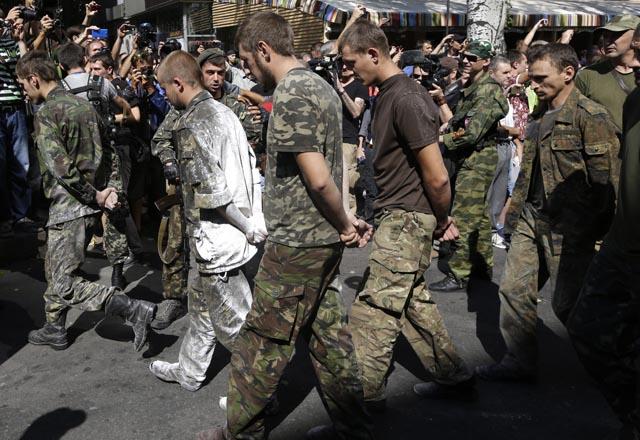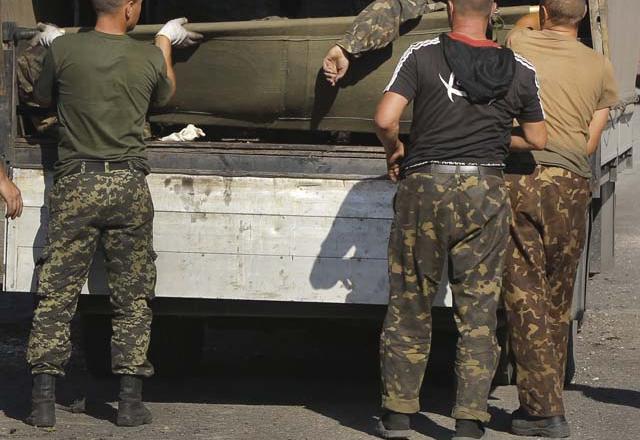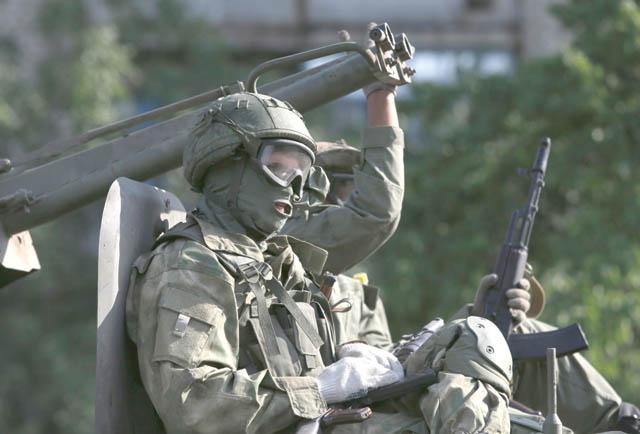You are here
Russian tank column enters southeast — Ukraine
By AP - Aug 25,2014 - Last updated at Aug 25,2014

KIEV — A column of Russian tanks and armored vehicles entered southeastern Ukraine around dawn Monday, a Ukrainian official said — a move that brings the conflict to an area that has so far escaped the intense fighting of recent weeks.
The reported incursion came a day ahead of a summit that includes both Russian President Vladimir Putin and Ukrainian President Petro Poroshenko, and could be aimed at pressuring Ukraine into seeking a negotiated end to the conflict rather than a military victory.
Over the past month, Ukrainian forces have made substantial inroads against pro-Russia separatists in eastern Ukraine, taking control of several sizeable towns and cities that had been under rebel control since April, when the clashes began.
But the advances have come at a high cost — more than 2,000 civilians reportedly killed and at least 726 Ukrainian servicemen. There is no independent figure for the number of rebel dead, although Ukrainian authorities said Monday that 250 rebels were in fighting around Olenivka, a town 25 kilometres south of Donetsk.
Intense fighting and shelling persists for the two major rebel-held cities of Donetsk and Luhansk.
Col. Andriy Lysenko, a spokesman for Ukraine's National Security Council, told reporters that the column of 10 tanks, two armored vehicles and two trucks crossed the border near the village of Shcherbak, and that shells were fired from Russia towards the nearby city of Novoazovsk. He said they were Russian military vehicles bearing the flags of the separatist Donetsk rebels. The village is in the Donetsk region, but not under the control of the rebels.
The Ukrainian National Guard later said two of the tanks had been destroyed.
In Moscow, Russian Foreign Minister Sergey Lavrov said Monday he had no information about the column.
The reported incursion and shelling could indicate an attempt to move on Mariupol, a major port on the Azov Sea, an arm of the Black Sea. Mariupol lies on the main road between Russia and Ukraine's Black Sea peninsula of Crimea, which Russia annexed in March. Capturing Mariupol could be the first step in building a slice of territory that links Russia with Crimea.
Although Mariupol is in Ukraine's separatist Donetsk region, most of the fighting between rebels and Ukrainian troops has been well to the north. A full offensive in the south could draw Ukrainian forces away from the city of Donetsk.
Lysenko said Mariupol for now has enough defenders "to repel any attack of uninvited guests".
Still, a wider war in the east would put new strains on Ukraine's military, which initially struggled with longtime underfunding and disorganisation against the rebel threat.
Ukraine of late has appeared bent on beating the rebels militarily, but pressure is growing for a negotiated settlement. German Chancellor Angela Merkel met with Poroshenko on Saturday and called for a political solution.
Poroshenko and Putin are among a group of leaders gathering Tuesday in Minsk, Belarus, for a summit, but it’s unclear whether they will meet one-on-one to discuss the crisis.
Lavrov, the Russian foreign minister, said Monday that he hoped European Union officials, who will also be at the summit, "will come prepared to use their influence on the Ukrainian side".
Ukraine and the West say that Russia is supporting and supplying the rebels. NATO says since mid-August, Russia has fired into Ukraine from across the border and from within Ukrainian territory. Moscow denies those allegations.
Fighting continued elsewhere in the east, notably around Olenivka. Lysenko said Monday about 250 separatists had been killed in that fighting, but did not specify in what time period. On Sunday, rebel leader Alexander Zakharchenko said two-thirds of Olenivka had been wrested away from Ukrainian control.
Ukrainian forces had made significant inroads against the separatists in recent weeks, but the rebels have vowed to retake lost territory.
Russia announced plans, meanwhile, to send a second aid convoy into rebel-held eastern Ukraine, where months of fighting have left many residential buildings in ruins.
Russia's unilateral dispatch of over 200 trucks into Ukraine on Friday was denounced by the Ukrainian government as an invasion and condemned by the United States, the European Union and NATO. Even though the tractor-trailers returned to Russia without incident Saturday, the announcement of another convoy was likely to raise new suspicions.
Lavrov said the food, water and other goods the convoy delivered Friday to the hard-hit rebel city of Luhansk were being distributed Monday, and that Red Cross workers were involved in talks on how best to do that. There was no immediate confirmation from the Red Cross.
In sending in the first convoy, Russia said it had lost patience with what it called Ukraine's stalling tactics. It claimed that soon "there will no longer be anyone left to help" in Luhansk, where weeks of heavy shelling have cut off power, water and phone service, and made food scarce.
The Ukrainian government had said the aid convoy was a ploy by Russia to get supplies to the rebels and slow down the government's military advances.
Related Articles
Ukraine said Russian tanks had flattened a small border town and pro-Russian rebels had made fresh gains in its east, as EU leaders signalled on Saturday they would threaten more sanctions against Moscow over the crisis.
Ukrainian forces have raised their national flag over a police station in the city of Luhansk which was for months under rebel control, Kiev said on Sunday, in what could be a breakthrough in Ukraine's efforts to crush pro-Moscow separatists.
Two columns of tanks and military vehicles rolled into southeastern Ukraine from Russia on Thursday after Grad missiles were fired at a border post and Ukraine's overmatched border guards fled, a top Ukrainian official said.


















